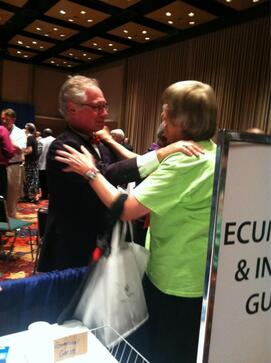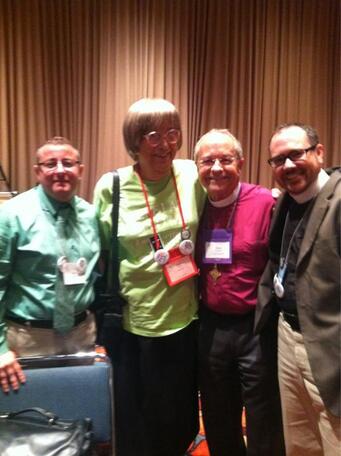 Bishop Marc Andrus of the Diocese of California greeted the Reverend Deacon Vicki Gray
Bishop Marc Andrus of the Diocese of California greeted the Reverend Deacon Vicki Gray As yesterday’s blog post left off, we were on the edge ofour seats as the bishops began their afternoon session.
At the conclusion of the morning session, Rev. Stephanie Spellers, a priest from my diocese (though soon to be of the Diocese of LongIsland) and one of the chaplains to the Bishops, had preached on one of the textsassigned for the day: Romans 8:18-27. From the lectern at the front of the room, she read it out deliberately:
I consider that thesufferings of this present time are not worth comparing with the glory about tobe revealed to us. For the creation waits with eager longing for the revealingof the children of God; for the creation was subjected to futility, not of itsown will but by the will of the one who subjected it, in hope that the creationitself will be set free from its bondage to decay and will obtain the freedomof the glory of the children of God. We know that the whole creation has beengroaning in labour pains until now; and not only the creation, but weourselves, who have the first fruits of the Spirit, groan inwardly while wewait for adoption, the redemption of our bodies. For in hope we were saved. Nowhope that is seen is not hope. For who hopes for what is seen? But if we hopefor what we do not see, we wait for it with patience.
She paused for several seconds before continuing:
Likewise the Spirit helps us in our weakness; for we do not know how to pray as we ought, but that very Spirit intercedes with sighs too deep for words. And God, who searches the heart, knows what is the mind of the Spirit, because the Spirit intercedes for the saints according to the will of God.
She went on to talk about our groaning as a church. We should not mistake this groaning simply for suffering, though it does indeed signal pain. Yet it signals something much larger: rebirth. We should not lose hope in the midst of our process, our transition, our rebirth. As I tweeted:
#GC77 Stephanie Spellers 'this groaning that you hear' is church being reborn. 'You would notbe sitting here now unless u believed it.'
We would not have been sitting there, would not still beworking here now, unless we believed it.
And, again:
#GC77 Stephanie Spellers: 'we are walking together in the space between.'#TransEpiscopal
Walking together in the space between—she could not have spoken more directly to my experience as a trans person had she been trying. And yet the beauty ofthese words were that they spoke both to my experience and to that of the church in its liminal, in-between location right now. That’s a connection I tried to name in the panel after Integrity’s showing of Out of the Box several days ago—as a trans person I feel like the place in which the church stands poised, forging its way forward into uncharted terrain, is familiar territory. It was so powerful tohear it from my friend Stephanie, and to hear it shared with the bishops I knowshe is so honored to support.
What amazing, nourishing preaching we have heard these last several days. Truly food for thejourney, for all of us.
So, after posting the “Edge of Our Seats” blog entry, I headed to the House of Bishops and took a seat in the gallery. It took about a half hour for D002 tocome up. The text is the same asthe 2009 resolution (C061). I had told my spouse and a friend I would text them as soon as debate began so they could watch comments on the GC#77 Twitter feed. So at 3:35pm when Bishop Mary Gray Reeves of the Ministry Committee presented D002 with a recommendation of passage, I texted a single word: “Now!!”
At 3:36 I then tweeted:
#GC77 D002 Bp Douglas speaking re: transgender res
At 3:38:
#GC77 Gene Robinson speaking in favor of D002 Trans nondiscrimination res
At 3:39:
#GC77 Mark Andrus speaking in favor of D002
At 3:41:
#GC77 Chet Talton of San Joaquin speaking in favor of D002, referencing ordination of a trans woman that he recently did
At 3:43:
#GC77 Bishop Love of Albany wants to know what 'gender expression' means. PB responds, how gender isexpressed in world. Thank you PB!
And again at 3:43:
#GC77 Texas seeks to end debate
And then:
#GC77 it passed!!!D002
I turned around in my seat and locked eyes with my TransEpiscopal colleagues seated behind me. Big smiles and weepy eyes.
Several things struck me right off the bat. First, that those in favor of the resolution were clearly ready to speak. Bishop Ian Douglas referenced the hard educating work he engaged in three years ago on the World Mission committee, to which C061 was sent last time. He explained what gender identity and expression meant, and how his daughter’s generation seemed more familiar and comfortable with transgender people than perhaps people of older generations knew. Bishop Robinson reiterated the strong support for the trans community that I have heard him share in numerous venues recently. Bishop Andrus spoke of how his diocese has ordained a trans woman to the diaconate who is passionate in her work for peace and justice (Vicki Gray, who has posted in this space before and is here as an alternate Deputy from DioCal). Bishop Chet Talton shared how his diocese has recently ordained a highly qualified Deacon (Carolyn Woodall, who is also here at GC, volunteering with IntegrityUSA) and how he sees other transgender people in congregations around the diocese of San Joaquin. When Bishop Love of Albany spoke, I was struck that he asked the same question I recall him asking three years ago, namely what “gender expression” is. There seemed to be some concern that it might be code for sexual activity. After Bishop Love’s question, the Presiding Bishop asked if someone would like to respond. A long pause ensued. Just as I started to worry that no one would respond, the Presiding Bishop herself leaned forward into the mike and explained that gender expression is simply how your gender is expressed in the world. I was so grateful that Bishop Katharine Jefferts Schori was willing to offer that simple, straight forward definition. Right afterward, thebishop of Texas called the question and the vote was taken.
Discussion had taken eight minutes, and D002 passed on avoice vote by a large margin—I would put it at 3/4 or perhaps 2/3 in favor.
The D019 debate then followed directly. Once more, starting at 3:45pm I tweeted:
#GC77 now onto D019.Beckwith speaking of his experience in All Saints Worcester. Bishop Shawspeaking in favor
At 3:46:
#GC77 South Carolina speaking against D019. Referencing 'gender expression', says Wikipedia definedgender expression as all over the map
At 3:49:
#GC77 Rochester, Bishop Singh, speaking of experience of living in liminal space; opportunity to engage liminal embodiment as a church
Again, at 3:49:
#GC77 Gene Robinsonspeaking in support if D019; addressing 'gender expression'
At 3:50:
#GC77 Lawrence of South Carolina speaking against
At 3:52:
#GC77 Bishop Andrus'when we have confusion about a group' that is precisely a reason to protectthem
And then at 3:53:
#GC77 bishops passD019!!
Once again, debate and passage had taken eight minutes.
What immediately struck me was how there was more resistance to this resolution about access of the laity to the life of the church than there had been to the resolution about access to the ordination process. Perhaps that is because there is less opportunity to regulate the laity, as a colleague here pointed out—people in the ordination process have to pass through many steps (including psychological testing). My own sense, however, is that the conversation about D019 was a continuation of the earlier one on D002. Bishop Lawrence of South Carolina, for instance, continued to push on the question about “gender expression.” And I didn’t tweet it, but here again the Presiding Bishop intervened when Bishop Lawrence made a statement about gender expression relating to same sex relationships and sexuality more broadly. “we aren’t talking about relationships at all,” she said. “We’re talking about individuals here.”
My bishop, Tom Shaw, spoke in favor, referencing the way in which we in the Diocese of Massachusetts have been able to reach out to the trans community and advocate in favor of transgender nondiscrimination legislation at the state level. It meant so much to hear him say that, as I’ve been walking with him in this work for a number of years now.
Bishop Beckwith of Newark spoke of his experience as a rector at All Saints in Worcester, in the Diocese of Western Massachusetts, where the transition of a trans man was moving not only for him but for the congregation as a whole. I know the folks to whom he was referring, and I was moved to hear this witness.
Bishop Singh of the Diocese of Rochester made a strong connection between trans embodiment and his experience of liminality—of being perceived as an American in India and an Indian in America—of being bi-cultural. He asked us to consider how the church’s own multiple identities, its threshold identity, could be deepened through our conversation about trans embodiment. This comment spoke so directly to themes close to my heart, my ministry and teaching, that I was essentially sitting there in an excited vibrational state. That this conversation could point toward the deep theological significance of this vote, and this conversation, not simply for trans people but for the church more broadly, left me truly excited and full of hope.
When the vote was taken, once more it passed by a significant majority.
TransEpiscopal members and our allies gathered outside the gallery after the House went into recess and gave each other huge hugs. This was a major step.
As we stood in the hallways, we learned that D022, the resolution calling for a Churchwide Response to Bullying, had passed the House of Bishops. I was surprised that it had come up so quickly, since the hearings had been a day apart. But there it was, another major step forward.
Now we wait for the House of Deputies to take up all three resolutions. It could happen latetoday, but most likely tomorrow (July 9). We are halfway there.
- The Rev'd Dr. Cameron Partridge


 RSS Feed
RSS Feed